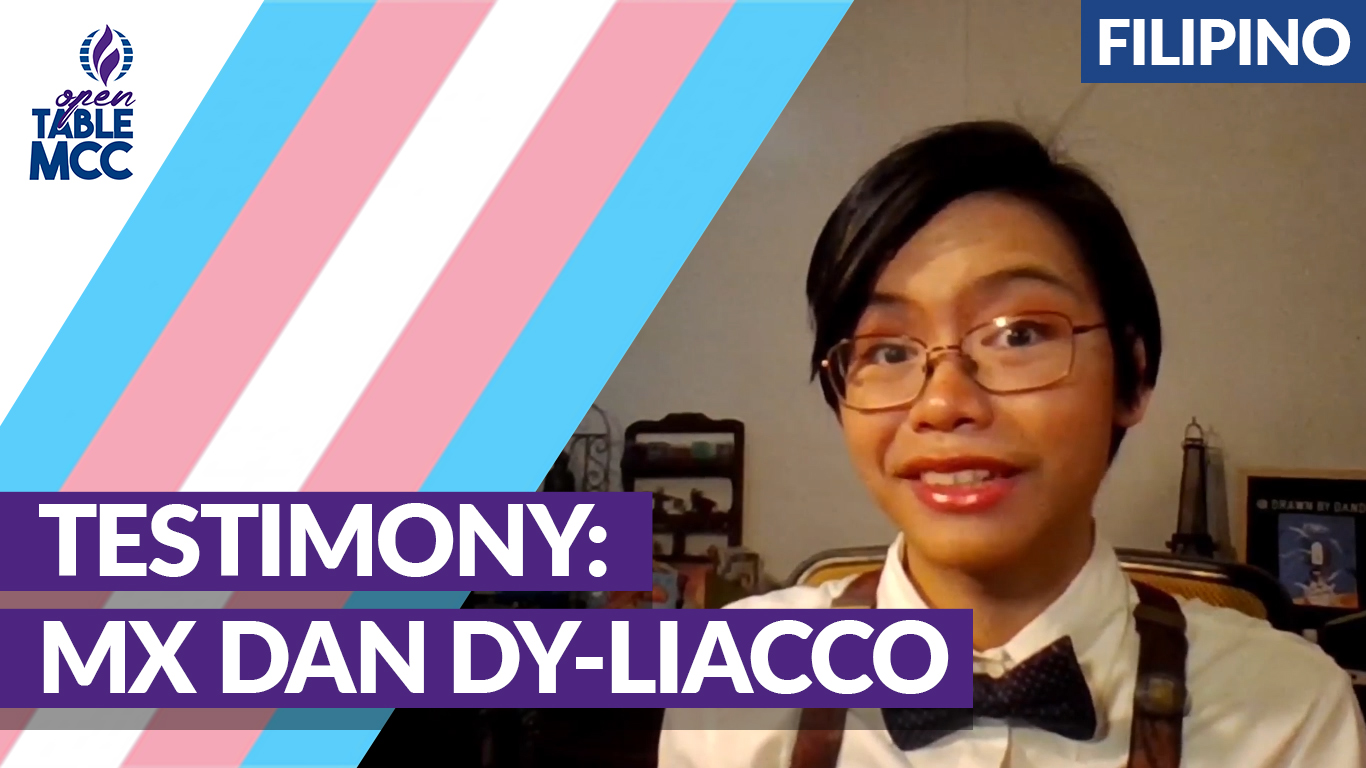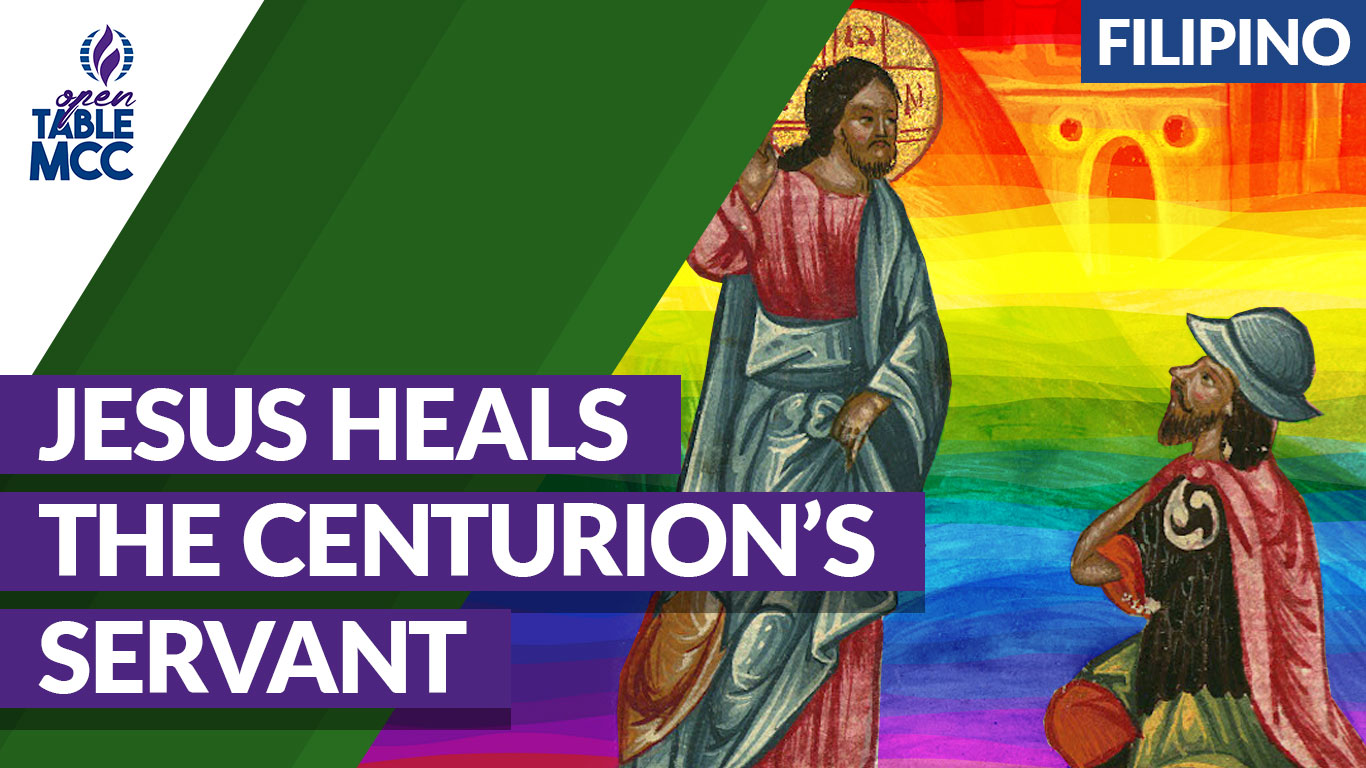For there are eunuchs who have been so from birth, and there are eunuchs who have been made eunuchs by others, and there are eunuchs who have made themselves eunuchs for the sake of the kingdom of heaven. Let anyone accept this who can.
Scripture Reading
Matthew 19:12 (NRSVUE)
Our Parent God in heaven, our God known by many names, and many identities, and many forms, thank you for 18 beautiful years of Christ’s ministry through His beautiful, prophetic, scandalous church in Open Table MCC. I pray for your anointing to come upon our hearts as we receive your blessing of edification, your blessing of friendship, your blessing of fellowship and love in this hallowed space. All these we pray in the name of the one whom we follow. Amen.
As LGBTQIA+ people, we have always had to try harder than most. Sa school, sa work, at iba pang bagay. We’ve always had to try harder that most. Even in finding stories in our sacred texts, ang hirap din. We still have to try extra hard to find them.
It’s very similar to how difficult it is for women to try to find women with personal and political agency in the text. Halos wala, ang hirap hanapin. We are, of course, fortunate of the many people who had come before us, who took the risk of reclaiming texts. MCC is central to that, but it is not exclusive to MCC. There were so many others before us. We are grateful for scholars, like Mona West, our very own Mona West, Elisabeth Schussler Fiorenza, Kwok Pui‐lan, Musa Dube, and others who demonstrated that the text surfaces the stories for us if we look a bit harder.
Whether they are descriptive of the shared oppressions of the othered, or naming the unnamed, or finding those muted narratives in the spaces between words, the task of finding ourselves in these stories is not simply a matter of scholarly prowess. We have to do it because it is a matter of our survival.
Take Mary of Magdala for example. Our recovery and extrapolation of her and her stories are the only reason why we can even celebrate her, or even revere her the way we do now. Because if we simply agreed with a sanctioned version of her story, as told by the early church fathers, Christianities today would be very different.
When Pastor Joseph told me that I had the liberty to choose the scripture reference today, I panicked a little. Really, I did not know how to handle that kind of freedom. So, I opted to reflect on the few lines from the 19th chapter of the Matthean witness.
Now this appears to be a very male body-oriented text. Eunuchs after all can only be male. A castrated male, who in Biblical antiquity and in empires, served in very specific social functions. Basically, they were people who were around very important people. And, by extension, they become important people. And they were among the most trusted individuals of the land. I’m not sure if this is the first time you’ve heard of eunuch, or at least an exposition of eunuch. But in Bible societies around the world, they often use the word “eunuch” to refer to gender expressions beyond the male and the female.
In the Bible, the word “eunuch” is used often to refer to people with a variety of different biological, social, and political identities and roles. When we read about a eunuch in the Bible, we could be reading about one: a person who was castrated as a young boy before puberty, who grew into adulthood without developing secondary sex characteristics such as deeper voices, or beards, or broad shoulders.
Or, someone born with genitalia or other sex characteristics that don’t clearly fit the society’s expectations of having a penis or a vagina. (These are people who today might identify as intersex.)
Or, a male prisoner of war. Or a servant who was castrated as an adult. These eunuchs would have already developed secondary sex characteristics.
Now, am I ready to say or infer that eunuchs are intersex or transgender? No, I am not, not yet at least. I am however prepared to say that they were neither man or woman. Because, in the context of the Matthean witness that we read today, sex-gender performativities almost exclusively tied to child bearing, because eunuchs are– by virtue of their physiology and psychology– excluded from this sex-gender performance equation.
Their classification therefore is ambiguous; societal classification is ambiguous. Eunuchs were widely accepted as having a gender outside of the male-female binary. Because eunuchs did not follow the same social norms as men or women and they participated in society outside of the strict separation of men and women. They were able to move freely between men-only and women-only spaces. Furthermore, their sexualities were not just ambiguous. They were also less controlled. Less sanctioned. Eunuchs were not involved in the politics of royal succession and the continuation of their family bloodline through fathering sons.
Eunuchs are often more free to have sexual relations and partnerships with both men and women throughout their lives. They were oftentimes considered as expert sex partners and in other sexual activity.
Now, our reading quotes the words of Jesus while he was in the middle of an argument with priests and experts of the law, who were probably trying to put him on the spot for not being married at that age. As a Jew, that was very problematic. As an Aramaic speaking Jew living in a Roman client state, who himself is a follower of John the Baptizer, this is extra problematic.
As you know, Rome ordered their society in the shape of little pyramids. This is how they exacted order in the realm and this is militaristic. This is political. This is how you kept those people under you in line. So, if you violated any of those little pyramids in the order that the Roman empire wanted you to follow, you would be crucified, lined up in the streets, and set on fire.
So, imagine then, this grown man who had in his permanent company, other grown men and women– some of them unmarried. Can you imagine?
Masakit siya sa mata.
And, hence, this discourse in this Matthean witness.
Jesus does not take the bait. Napakahusay. Miss Universe. Perfect talaga siyang sumagot. He does not take the bait of the religious leaders trying to discredit him and he gives an answer that was not just flawless, it gave us an insight into matters that were otherwise relegated as not central to his work and ministry.
He lived into the intentional subversion of the little pyramids of the Roman familus. He had very little to say about gender-sex layer. When he did talk about sex-gender dynamics, He says, “For there are eunuchs who have been so from birth, and there are eunuchs who have been made eunuchs by others, and there are eunuchs who have made themselves eunuchs for the sake of the kingdom of heaven.”
Kung kaya niyong tanggapin ‘yon, tanggapin niyo.
Eunuchs, in fact, transgress sex-gender spaces.
Like us.
Feeling ko, kahit hindi naman magsakto ‘yong definition, kung mayroon man akong makakapag identify ako, Eunuchs ‘yon.
Eunuchs transgress not just sex/gender spaces, but also political spaces, as we do.
Kaninang umaga, I was in another church anniversary. The seventh year of the ‘Bungkalalan’ in Lupang Ramos. Bungkalan is a form of transgression, dahil binubungkal ng mga magsasaka ang lupa kahit sinasabihan sila na hindi ‘yan sa kanila. Matagal na silang nandiyan. Tatlong henerasyon na. Ngunit hindi naman nila naisip na patituluhan ‘yong kanilang mga sinasaka.
Napilitan silang mag “try harder,” like us.
So one time, sabi ng isang magsasaka sa akin: “Pastor, ikuwento mo nga sa amin ‘yong tungkol sa SAJI.”
Sabi ko, “Ano pong ibig n’yong sabihin?”
“SAJI po– ‘yong tungkol sa mga bakla.”
Sabi ko, “ah talaga ba, gano’n?”
Then after I was talking to this person, I told them… “Bakit ‘di tayo sumama sa Pride March?”
Sabi nila, “oh sige po, kailan po ba? Rally po ba ‘yan?”
“Oo, rally, pero masayang rally, hindi tayo sasaktan ng pulis.”
Sabi niya, “sige po pastor punta kami.”
These are farmers, farmers who had no land. Farmers who have to insist, try harder than most just for the right to till the land.
And so anyway… Sumama sila. Anim na jeep sa Marikina. Tapos, sabi ko, titigil muna tayo do’n sa simbahan ng isa kong kaibigan. Doon tayo mag-aral ng tungkol sa SOGIE. Tapos ipa-process din namin pati ‘yong paggagagawa nila ng placard, pagkukuwento ng mga nais nilang ipahayag sa LGBT community.
Madali nilang nakuha ang SOGIE sa aking pagtuturo. Bakit? Kasi unawang unawa nila ang opresyon. Ang dali-dali nilang naintindihan.
And when they saw Marikina– I think that was the one of the more well-attended Pride Marches– Sabi nila, “Pastor… “sana… puntahan nila kami.”
So, sabi ko: “Well… Tingnan natin, kung mayro’n silang ganiyang pag-appreciate sa struggle, kung nauunawaan nila ‘yong intersection at pagkakahalintulad ng ating struggle.”
And since then, of course, MCC has done visits to the farmers of Lupang Ramos.
Now I told this story about the Lupang Ramos Community Church. Because, kung dito ko naintindihan ang diskurso ng “eunuch,” Doon ko naintindihan ang diskurso ng “kingdom of heaven.”
There, among the farmers of Lupang Ramos who have to till land under duress– is where the Kingdom of God or the Kingdom of Heaven made the most sense to me. All the Kingdom of God or the Kingdom of Heaven narratives became easier to grasp when I became a witness to these struggles. The farmers’ struggles for land, and the right to simply till it. So they can grow food to feed all of us. The right to simply live. And that is how I define the Kingdom of God or the Kingdom of Heaven. It is through understanding the plight of farmers who will insist on life, no matter what.
The way Jesus said this in the discourse in our text, it was as though he was narrating the kinds of eunuchs: those who are born that way, those who are made eunuchs by others, those who choose to be eunuchs for the sake of the kingdom of heaven.
Maganda naman. Sagot niya ‘yon eh.
Pero in witnessing the life and work of Open Table MCC, feeling ko, we are 3-in-1. Kasi lahat kayo, lahat tayo. We were born like this. We were made to be like this. And we choose it prophetically for the sake of the kingdom of heaven.
When I was pastor of MCC Quezon City about a decade ago, there, in the little yellow room in Cubao, na ang problema lang namin ni Tyang ay bayad ng kuryente at tubig at renta, at kung ano ang pangpamasahe namin pabalik ng seminaryo… Standing here now, looking at all of you, here in this beautiful space…
Hindi to inabot ng imahinasyon ko. Hindi talaga.
So if you’ll ask me about possibilities and potentials? Well my answer was biblical-theological.
Pero itong tanong: ano ang mga posible? Ano ang mga potensyal? Look at each other… and I promise you, the impossible will come to the realm of possibility.
Sobrang proud na proud ako sa simbahang ito. Sa dinami-dami ng kaniyang pinagdaanan. Ang simbahan ng mga ‘eunuch,’ na ipinanganak na ‘eunuch,’ ginawang ‘eunuch’ ng lipunan, at pipiliing maging ‘eunuch’ sa ngalan ng kaharian ng Diyos.
Isiah 56: 3-5: And let no eunuch complain, “I am only a dry tree.” For this is what the Lord says: “To the eunuchs who keep my Sabbaths, who choose what pleases me and holds fast to my covenant— to them I will give within my temple and its walls, a memorial and a name better than sons and daughters; I will give them an everlasting name that will endure forever.
Happy birthday, MCC!
Podcast: Play in new window | Download
Subscribe: Apple Podcasts | Spotify | RSS



